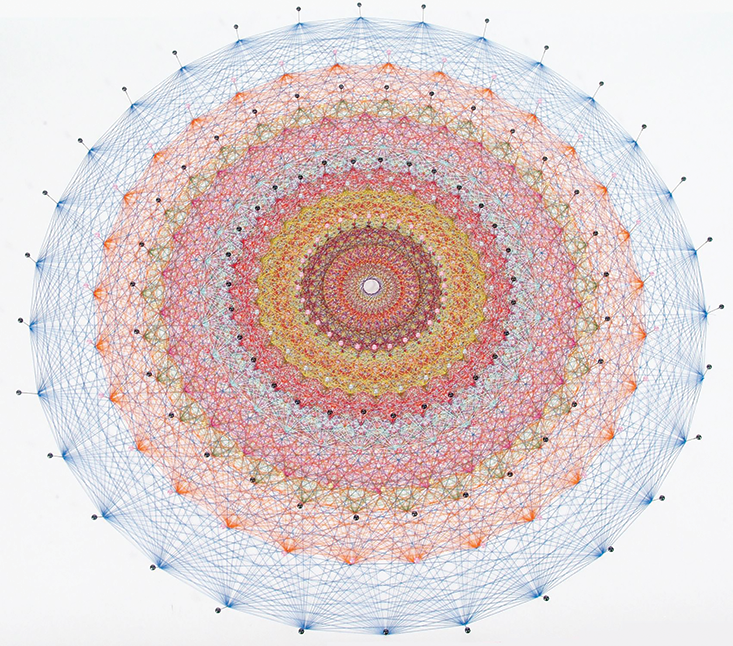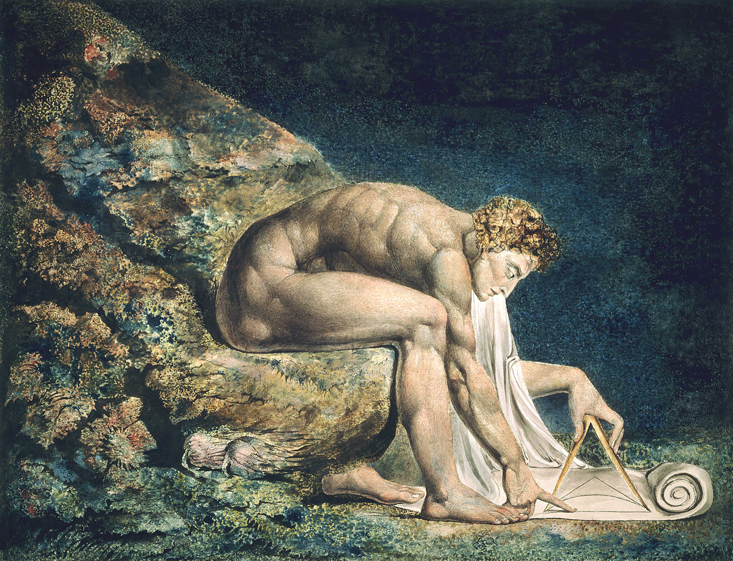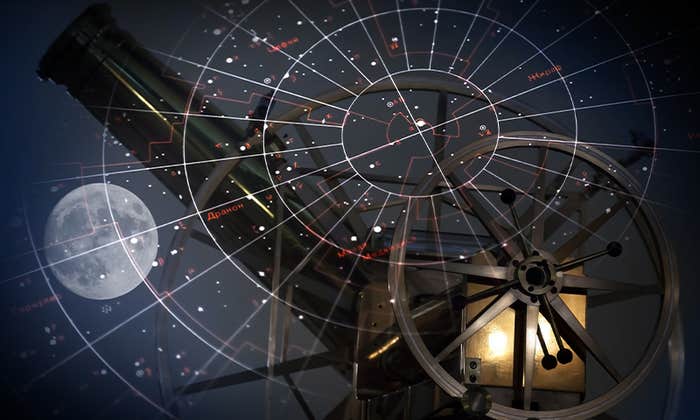We recognize beauty when we see it, right? Michelangelo’s David, Machu Picchu, an ocean sunrise. Could we say the same about the cosmos itself? Frank Wilczek, a professor of physics at the Massachusetts Institute of Technology, thinks we can. And should. In his new book A Beautiful Question: Finding Nature’s Deep Design, Wilczek lays out his case for the elegance of mathematics and the coherence of nature’s underlying laws.
Wilczek won the 2004 Nobel Prize in Physics for discovering, with David Gross and H. David Politzer, equations that govern one of the fundamental forces in physics, the strong interaction, which holds together quarks and gluons, and makes protons and neutrons. Their discovery of “asymptotic freedom” showed that as quarks get closer to each other, the charge between them grows weaker.
I love its weirdness and strangeness and the fact that it’s the way the world actually works.
Wilczek’s specialty is quantum theory, but the impact of his work has been apparent in cosmology—in the study of black holes, dark matter, and the age-old mystery of how something can arise out of nothing. Now 64, he has been seeking designs in nature since he was a young math student. “I liked playing with patterns and thinking about that kind of abstraction,” he says. “I was very interested in mathematical logic, which is a branch of philosophy, and the theory of how the mind works. I studied some neurobiology and computer science as I tried to figure out how abstract patterns map onto the workings of minds.”
Wilczek is not just a leading theoretical physicist but a student of philosophy and admirer of poet William Blake and Renaissance Italian architect Filippo Brunelleschi. In conversation he laughs readily and takes obvious delight in leaping from one idea to the next, whether he’s talking about string theory, The Matrix, the native intelligence of animals, or the wrong-headed views of philosophy held by scientists like Neil DeGrasse Tyson.
You say there’s beauty in the design of nature. That seems to be a matter of aesthetics. Is it a scientific question?
It is a scientific question. The exact question I’m trying to address is whether the world embodies beautiful ideas. That’s a question about the world on the one hand and beauty on the other. Beauty is notoriously subjective and comes in many forms, but there is a historical record in art and philosophy that one can consult to see what people have objectively found beautiful. We can consult science and compare whether the concepts that emerge from the fundamental laws of nature have something in common with what people find beautiful.
Does it matter to a scientist if the world is beautiful?
I don’t think science is walled off from the rest of life. So yes, it matters to me a lot whether the world is beautiful. It’s also a practical question for physicists, engineers, and designers. At the frontiers of physics, we’re dealing with realms of the very small and the very large and the very strange. Everyday experience is not a good guide and experiments can be difficult and expensive. So the source of intuition is not so much from everyday experience or from a massive accumulation of facts, but from feelings about what would give the laws of nature more inner coherence and harmony. My work has been guided by trying to make the laws more beautiful.

What is a beautiful law?
Two things stand out as common features of laws and equations that people find beautiful. One is what I call exuberance or productivity, where you get out more than you put in. You find some equation or law by putting together clues and making a guess, and then you can explain seven other things and you know you’re on the right track. You get out more than you put in. Symmetry is especially prominent in the fundamental laws of nature. As it’s commonly used, symmetry is kind of vague but somehow connotes harmony and beauty. The scientific usage is more precise and has been extremely fruitful. It’s change without change. You can make changes in physical objects or changes in the laws that could change them but don’t. A circle is symmetrical in the sense that you can rotate it around its center by any angle but the circle as a whole is unchanged. Most shapes, like triangles, look different if you rotate them.
So if you go down to the deepest structures of the universe—the laws of physics—are you saying there is profound symmetry?
Yes. Take the fact that the laws are eternal. That doesn’t sound like symmetry, but it is because the laws don’t change as the universe ages. So we have a change without change.
Suppose the universe didn’t embody beautiful ideas or elegant mathematical structures. Can we even imagine the laws of nature if they were full of asymmetries or imperfections?
I’ve wrestled with this question and there’s a thought-experiment that I find very satisfying. As computers get better and artificial intelligence gets better, you can make plausible thought experiments along the lines of The Matrix, where intelligence is embodied within a computer, and what it thinks of as its world is actually something that’s been programmed.
So we are just living in a computer simulation?
Let’s imagine ourselves in Super Mario’s World. The laws of physics wouldn’t look particularly beautiful. They would change with time and place. They would have a quirkiness to them that’s logically consistent but is very different from the way our world works, where the laws don’t change in time or place, and have a kind of reproducibility. Once you understand the small parts, you can build up by deduction to figure out how the large parts work, whereas in a programmed world, it’s just a matter of what the programmer’s whims were. It doesn’t have to make sense or be beautiful. So I don’t think there’s anything logically necessary about the beauty of the laws. Of course, they might’ve been much harder to discover if they weren’t beautiful, so the comprehensibility of the laws is to me even more mysterious than their beauty. It didn’t have to be that way, but it is.
I don’t think any of the received religions do justice to what I’ve discovered about the physical world.
Was beauty important to Einstein and the other founders of modern physics?
Absolutely, although they didn’t always think about it explicitly. Einstein and [James Clerk] Maxwell—and going back to Newton—all had this instinct for breaking down problems into small parts, with the idea that they would be comprehensible, and then you could build up to more complicated things that would have this kind of exuberance. Einstein was the decisive figure in bringing this second aspect of the beauty of nature—symmetry—to new heights. The theory of relativity is very much in the mold of change without change. You can look at the world from a moving platform and different things rushing at you or away from you will look quite different, but the same laws will apply as in the stationary frame. That’s the essence of the theory of relativity. You change the way things look and yet the laws are still valid.
Einstein didn’t like the idea of quantum entanglement, where two particles interact with each other on opposite sides of the universe. Did that violate his sense of beauty?
It violated his sense of determinism that the laws should always lead to the same consequences. He’s famously thought to have said that insanity is doing the same thing over and over again and expecting different results. Yet that’s exactly the way quantum mechanics works. So he didn’t like it. But parents don’t always approve of the way their children turn out. Quantum mechanics is a framework that doesn’t itself seem to embody symmetry, although at a deeper level I think maybe it does. Quantum mechanics turns out to be a wonderful platform if you build equations that obey its principles. Those equations can support enormous amounts of change without change that go beyond anything in classical physics, and they truly describe the world.
We can’t predict what a particular particle is going to do at the quantum level. Do these irregularities that bothered Einstein also trouble you?
No, I love it. I love its weirdness and strangeness and the fact that it’s the way the world actually works.
This doesn’t violate your sense of order?
You know, it’s profound. In quantum mechanics, the primary description of reality is something called a wave function and the equations of the wave function are actually deterministic. They’re perfectly definite equations. If you know the wave function at one time, you can predict what it’s going to be at another time with no ambiguity. The problem is that it’s impossible experimentally to know what the wave function is. So the deep structure is determined, but from where we sit within the universe, it’s not something we can determine. Operationally, that means things look unpredictable. There are vast mounds of experimental data and experiences that directly confirm this aspect of quantum mechanics. Basically, all modern particle accelerators are based on doing the same thing over and over again: bashing together electrons and anti-electrons at exactly the same energy and exactly the same configuration. But different things come out. You do it billions of times and each time a different thing comes out. So it’s not a matter of opinion.

Are humans really uncovering the deep structure of the universe? Or is this just our version of reality, given the way our brains work and how we see the world?
Well, physics works. You can’t design iPhones or the Large Hadron Collider or missions to Pluto without a description of the world that works in very detailed ways. So it’s not a fantasy. However, there could be different ways of organizing your thoughts. Some things would seem obvious to creatures that were evolved from intelligent spiders that seemed less intuitive to us. So the ways the laws get written down could look different in significant details, but I don’t think the results are negotiable. The world is what it is.
You have a fascinating thought experiment. If dogs or birds had advanced abstract reasoning, would they be good at physics?
I think birds would be very good but dogs not so much. The dog’s world is primarily based on smell. Of course, chemical senses can support a rich life of communication and appreciation of food. You smell a madeleine and remember the past. But even if you’re very smart and have a rich social life, it’s hard to get from sensations of smell to Newton’s laws of motion and mechanics. Humans are primarily visual animals, so we have powerful ways of understanding how things move through space. We’re lucky that we can see the planets. That gives us a nice opening into astronomy and understanding gravity.
So what’s special about birds?
Birds would have all that and more. Our experience is dominated by friction and the force of gravity here on Earth, which historically have caused great problems in understanding what inertia is. But birds just flap their wings for a while, then stop and glide, so they know about inertia. They would also have an intuitive sense of relativity—that the laws don’t change if you’re moving at a constant velocity. They experience that every day. So if birds became intelligent, I think they would make more rapid progress on physics than humans have. Spiders would also have a different perspective. They communicate through touch and the vibrations of their webs. They would have a very good entry into field theory and electricity.
The laws of physics apply to the brain, so you shouldn’t be searching for a soul or something immaterial.
One danger for a theoretical physicist is that you can get so caught up in the beauty of your equations and how everything fits together that you become detached from the physical world. You still need empirical tests to prove this underlying structure. Is this an occupational hazard for you?
It absolutely is. The great physicist Richard Feynman liked to say you have imagination, but it’s imagination in a straitjacket. To me it assumes a different level of interest when your ideas suggest experimental consequences that you can check.
What if there is no “theory of everything” that unites the laws of physics? Where does this leave your argument for nature as a work of beauty?
The argument is still correct. We already know there are beautiful laws that explain most of the way matter works. It’s just that we haven’t figured it all out. It’s difficult to exaggerate how symmetric, how fruitful, how creative the laws are. It’s a great gift. But we’re not satisfied because there are some annoying little flaws like in the story “The Birth-Mark,” where there’s this little imperfection that obsesses her suitor. So we’re trying to find new phenomena that would allow us to have even more symmetry and would make the equations more beautiful. But the ultimate verdict is experimental.
You seem somewhat unusual for a scientist. You clearly love to explore these big ideas. Did you ever think about becoming a philosopher rather than a physicist?
Absolutely. When I was a young teenager, my heroes were Einstein on the one hand and Bertrand Russell on the other. I loved reading about philosophy and thinking about those kinds of questions.
In the last few years, some high profile physicists, including Stephen Hawking, Lawrence Krauss, and Neil DeGrasse Tyson, have made disparaging comments about philosophers, basically saying they have little value to the real world of science. What do you make of these attacks on philosophy by your colleagues?
I think it shows lack of imagination and lack of knowledge of what philosophy is all about. There is a lot about the world besides the laws of physics and physical phenomena. There are centuries of experience of wrestling with these problems and refining those concepts. It’s unwise and borderline silly to just write that off. As Einstein did, I’ve derived tremendous inspiration from the philosophical literature, from sharpening your mind against David Hume or Ernst Mach or Bertrand Russell.
Philosophers don’t just wonder how everything fits together. They ask if the universe has meaning. Does that question resonate for you?
Yes, of course. I care very much about what it all means. That’s what drives a lot of what I do.
So what does it mean?
I don’t think that’s the right question because I’m not sure what an answer would look like. I was very happy to come up with a different version of that question, which can be addressed in a very fruitful way: Does the world embody beautiful ideas? You can look at that question in an enlightening way by looking at the history of people’s ideas about beauty before they knew the laws of physics and then compare that to what we’ve actually found. You get an enriched perspective on both art and science.

If someone needs a deeper system of values to fall back on, are you saying beauty would be a good place to look for it?
Yes. Some people derive joy and understanding from the dogmas of different religions, and that’s one way to organize your life. I don’t find that possible because I don’t think any of the received religions do justice to what I’ve discovered about the physical world. It’s not so much that they’re wrong, although many details are wrong, but they just don’t do justice to the profound surprises that science turns up about how big the universe is, how old it is, how many little things go into making the big things we experience in life. That means it’s on us to figure out and make the meaning. And for me beauty is one of the big discoveries that goes into what it all means. That’s been a great source of joy.
One of the deepest questions for both science and religion is the question of origins. How did the universe begin, or does it even have a beginning? How does something come out of nothing? Lawrence Krauss claims this isn’t all that mysterious. He says vacuum states are unstable in quantum field theory, so it’s not unusual for states to pop in and out of existence.
In fact, my friend Lawrence was quoting my work. I don’t understand all the implications but the equations don’t permit stable solutions that have nothing. Void is a very different thing from a solution of the fundamental laws of nature, so if void is not allowed, that is an explanation for why there’s something rather than nothing. But I don’t think it really gets to the question that philosophers are asking.
They’re asking where the laws of physics come from.
Exactly. Where did the equations come from? We know that void is not a correct idea. It’s not a possibility given the laws that we know.
So there’s no such thing as empty space?
That’s right. The concept that space is an empty, passive receptacle that has no inner life is totally wrong. In quantum mechanics, space has spontaneous activities. These are called “virtual particles.” Part of what I got the Nobel Prize for was figuring out how virtual particles affect the real particles we see.
What are virtual particles?
It’s as if we’re living on the surface of a planet that has a lot of activity going on underneath that’s not seen on the surface, but affects the way the world is. In the laws of fundamental physics, the fields—for instance, electric and magnetic fields—have spontaneous activity. Virtual particles come into being for a very short time and then pass away without ever being something that can be sensed by our eyes or our instruments. But they’re in the equations and they affect the properties of particles that we do see and can calculate and check. So there’s no doubt that space—which I sometimes call “the grid”—is a source of activity. That’s one reason why it’s not a void. It has a life.
So if we’re looking for the most fundamental thing in the universe, it’s not particles or matter. Is it this space that you’re talking about?
Yes, space itself has a life of its own. To understand what we perceive as empty space is really the key to understanding how the whole universe works. I like to joke with my students that in Newtonian mechanics, the key is to solve the problem of how one body moves around another, like the earth moves around the sun. In quantum mechanics, the key problem is the “nobody problem” and it’s empty space that runs the show. The particles we actually see are a kind of epiphenomena on top of the structure of empty space.
We’ve been talking about the difficulties of reconciling the immaterial world with matter, and the biggest mystery of all might be the “mind-brain problem”— how the immaterial world of our minds comes out of three pounds of gooey stuff in our brains. Is this a problem for physics, or should we leave that to neuroscientists?
The laws of physics apply to the brain, so you shouldn’t be searching for a soul or something immaterial in addition to the particles that make up the brain. A good working hypothesis is that the brain is like a computer and the puzzle is to understand how the physical object obeying the laws of physics can do computations and make a mind. Then there’s the more technical question of whether the way we use physics to describe objects in the physical universe can be used to illuminate how the brain works—whether ideas about symmetry, material science, and electrical conduction will be important for neurobiology. I think there’s a good chance the answer is yes. Parts of the brain are very regular and symmetrical. The cerebellum is very structured. Neural nets are another development I find absolutely fascinating. Artificial neural nets are an idealization of nerve systems in the brain, but they use laws of computation that physics people would recognize. In fact, physicists invented a lot of these techniques because they look like the equations that govern electrical circuits. So I think physics has a lot to offer neurobiology.
Do you think science will ever crack the fundamental problem of how we get our mental world out of material stuff?
Yes, I do. How should I say it? I think we’re maybe 90 percent of the way there.
You’re an optimist!
No, I think I’m just interpreting things correctly. Not long ago it seemed very mysterious that patterns of ones and zeros could encode how you do computations; for instance, how you play chess. But now we can design systems that work on ones and zeros that do something very much like thinking. Increasingly you have meaningful interactions with systems like Siri that are just manipulating patterns of ones and zeros. Those ones and zeros are embodied in physical objects, namely transistors, so that’s very close to saying that mind is embodied in physical objects. These are concrete objects that we designed.
Steve Paulson is the executive producer of Wisconsin Public Radio’s nationally syndicated show To the Best of Our Knowledge. He’s the author of Atoms and Eden: Conversations on Religion and Science. You can subscribe to TTBOOK’s podcast here.
*As originally published, this image was credited incorrectly.






























